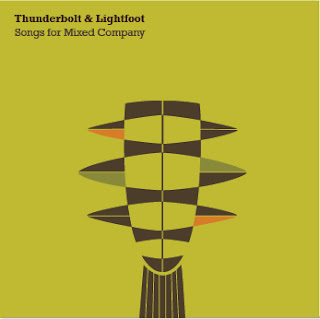Written
by Frank McClure, posted by blog admin
Thunderbolt
and Lightfoot’s first full length studio release Songs for Mixed Company
denotes a high water mark in the careers of its respective participants. Phil
Barry and Sarah Fuerst are the core of Thunderbolt and Lightfoot, but they are
accompanied by some top notch players, namely multi-instrumentalist and
organist Mike Lynch. Lynch’s contributions are key to this effort as his
playing supplies an ample amount of color to songwriting that, otherwise, might
seem relatively spartan and unadorned. The duo is classified as a folk act, but
the classification is misleading. Thunderbolt and Lightfoot have extended
themselves in surprising ways through the course of this collection – namely,
the inclusion of electric guitar and Mellotron distinguishes these songs from
the work of the duo’s peers and they manage this diversity without ever ceding
any of the strengths that drew their self-titled debut EP such well deserved
attention.
They
start off, however, working from their most basic strengths. “Let’s Be Friends”
is straight singer/songwriter material cast in a folk mold and benefits
enormously from the on point marriage of their voices and Barry’s eloquent,
tempered guitar work. The subject matter is relatively familiar, but
Thunderbolt and Lightfoot imbue it with a distinctive poetic sensibility that
never overreaches. They show some talent for inventive mimicry on the track “Miss
Me”, a loving homage to a certain kind of country music that simply isn’t
written and recorded much anymore. It stands, however, as an intensely personal
statement thanks to how much their vocals invest in the performance and ends up
sounding like something ripped from the pages of their respective lives. There
are lyrical subtleties, as well, incorporated into the composition further
distinguishing it from similar efforts and helping it stand on its own as an
original work. “Sad Song” goes in another direction entirely as they largely
abandon traditional folk sounds in favor of low-key orchestration complete with
keyboard work and the presence of pleasing strings. Despite their scant
previous work exhibiting no grounding for this sort of experimentation,
Thunderbolt and Lightfoot prove quite adept at bringing other sounds into the
mix.
Accordion
and tempo choices give “Goodbye is Not the End” a surprising bounce that
memorably contrasts with the relatively downcast attitude of the lyrics but, as
the title implies, the song retains a flicker of hope that mitigates its
otherwise darker emotions The vocals play it remarkably straight and hold back
from over-dramatizing the lyric. “Vesper” is the album’s sole instrumental and
much more than just filler – they conclusively prove themselves to be quite
entertaining despite the absence of vocals and the melody carrying the track
along will stick with listeners long after the album concludes. “Sweetest Baby”
is another of those moments when Thunderbolt and Lightfoot frame difficult or
thorny emotions in an appealing musical package thus making the adult subject
matter more palatable to the audience. The album’s finale “Dearly Beloved”
closes things with a refreshing amount of humor – Thunderbolt and Lightfoot
could have went in a more serious route based on the preceding material, but
they opt for a smiling love song instead and it hits a nice balance against the
furrowed brow of the earlier songs. This release is a true success and should
appeal to many regardless of genre. The duo traffics in real human emotions and
situations while still presenting a compelling musical product.


No comments:
Post a Comment